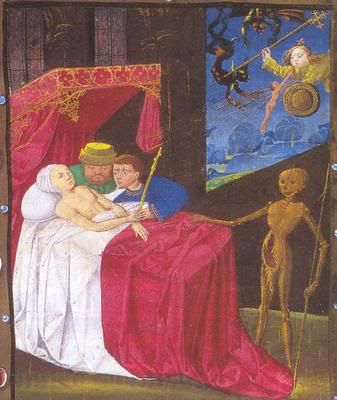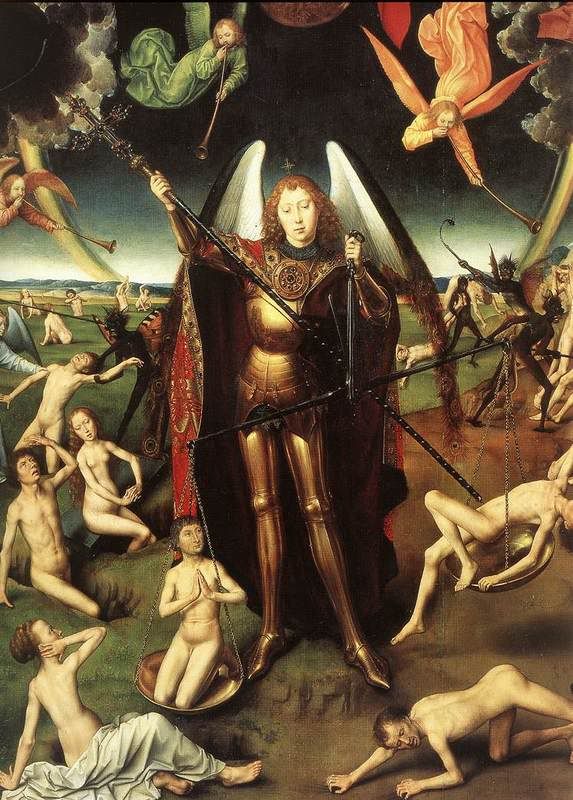Friday, September 30, 2011
Saint Jerome

The Golden Legend

The Catholic Encylopedia

A familiar image to old readers, once a banner image here at Recta Ratio
Saint Jerome, please pray for us!
Labels: Our Saintly Brethern
Thursday, September 29, 2011
Michaelmas 2011

Today is Michaelmas, the Feast of Saint Michael and All Angels.
Saint Michael, perhaps the greatest of the Archangels, is the protector of the Church.
Michaelmas was a quarterly rent day in England and Ireland. It is the start of the university term at both Oxford and Cambridge. Presents and feasts featuring geese were very much the custom at this time of year.
Check here and here for Michaelmas customs.
Sancte Michael Archangele, defende nos in proelio, contra nequitiam et insidias diaboli esto praesidium. Imperet illi Deus, supplices deprecamur: tuque, Princeps militiae caelestis, Satanam aliosque spiritus malignos, qui ad perditionem animarum pervagantur in mundo, divina virtute, in infernum detrude.
Amen.
Saint Michael the Archangel,
Defend us in battle.
Be our protection against the
Wickedness and snares of the devil.
May God rebuke him,
We humbly pray.
And do thou,
O Prince of the Heavenly Host,
By the Divine Power,
Thrust into Hell
Satan and all the other evil spirits
which prowl about the world,
Seeking the ruin of souls.
Amen.

St. Michael protecting a newly deceased soul from the clutches of demons lurking by the deathbed.
Saint Michael also has another important duty. He is the principal usher of newly deceased souls to heaven. Medieval Books of Hours, as part of the Office of the Dead, often included a deathbed scene, where the soul of the just-departed leaves the body, and St. Michael has to fight off various demons who try to snatch the soul and carry it off to Hell. St. Michael is, therefore, one of the saints whose intercession is customarily invoked for a happy death, along with Our Blessed Lady, St. Joseph, and St. Peter.

And of course, St. Michael is believed to be the one who will measure the worthiness of souls at the Last Judgment, as seen in this detail from Memling's Last Judgment triptych.
Here is a site with prayers to Saint Michael, including the variations of the basic prayer above.

Labels: Our Saintly Brethern
Wednesday, September 28, 2011
Saint Wenceslaus
Sunday, September 25, 2011
The Fifteenth Sunday After Pentecost
From The Liturgical Year, by Abbot Prosper Gueranger, OSB:
THE Introit for this Sunday, which now goes under the name of the Sunday of the widow of Naim, because of the Gospel read on it, gives us a sample of the prayers we should address to our Lord in our necessities. Last Sunday we heard our Jesus promising to provide for all our wants, on the condition that we would serve Him faithfully, by seeking His kingdom. When we present our petitions to Him, let us show Him the confidence He so well deserves from us; and we shall be graciously heard.
Holy Church resumes the lesson of St. Paul, where she left it last Sunday. The spiritual life--the life produced in our souls by the holy Spirit, in place of the former life of the flesh--is still the subject of the apostle's teaching. When the flesh has been subdued, we must beware of supposing that the structure of our perfection is completed. Not only must the combat be kept up after the victory, under penalty of losing all we have won, but we must also be on the watch, lest one or other of the heads of the triple concupiscence take advantage of the soul's efforts being elsewhere directed, to raise itself against us, and sting us all the more terribly, because it is left to do just as it pleases. The apostle warns us here of vain-glory, and well he may; for vain-glory is, more than other enemies, always in a menacing attitude, ready to infuse its subtle poison even into acts of humility and penance; hence the Christian, who is desirous to serve God, and not his own gratification, by the virtues he practises, must keep up a specially active vigilance over this passion.
Let us think for a moment of the madness that culprit would be guilty of, who having his sentence of death commuted for a severe flogging, should take pride in the stripes left in his body by the whip! May this madness never be ours! It would seem, however, as though it were far from being impossible, seeing how the apostle, immediately after telling us to mortify our flesh, bids us take heed of vain-glory. In fact, we are not safe on this subject, excepting inasmuch as the outward humiliation, inflicted by us on our body, has this for its principle, that our soul should voluntarily humble herself at the sight of her miseries. The ancient philosophers, too, had their maxims about the restraint of the senses; but those among them who practised those admirably worded maxims found them a stepping-stone for their pride to mount up mountains high in self-conceit. It could not be otherwise; for they were totally devoid of anything like the sentiments which actuated our fathers in the faith, who, when they clad themselves in sackcloth and prostrated on the ground, 2 cried out from the heartfelt conviction of the miseries of human nature:`Have mercy on me, O God, according to Thy great mercy! for I was conceived in iniquities, and my sin is ever before me!'
To practise bodily mortification, with a view to get the reputation of being saints, is it not doing what St. Paul here calls sowing in the flesh, that in due time--that is, on the day when the intentions of our hearts will be made manifest --we may reap, not life and glory everlasting, but endless disgrace and shame? Among the works of the flesh mentioned in last Sunday's Epistle, we found contentions, dissensions, jealousies, all of which are the ordinary outcome of this vain-glory, against which the apostle is now warning us. The production of such rotten fruits would be an unmistakable sign that the heavenly sap of grace had gone from our souls, and that in its stead there had been brought the fermentation of sin; and that now, having made ourselves slaves as of old, we must tremble because of the penalties threatened by God's law. God is not mocked; and as to the confidence which generous fidelity of love imparts to those who live by the Spirit, it would, in the case we are now supposing, be but a hypocritical counterfeit of the holy liberty of the children of God. They alone are His children, whom the holy Spirit leads in charity; those others are led on by the flesh, and such cannot please God.
If, on the contrary, we would have an equally unmistakable sign which is quite compatible with the obscurities of faith, that we are really in possession of divine union, let us not take occasion from the sight of others' defects and faults to be puffed up with pride, but rather from the consideration of our own miseries, be indulgent to everyone else. If others fall, let us give them a helping and prudent hand. Let us bear one another's burdens along the road of life, and then, having thus fulfilled the law of Christ, we shall know (and oh! the joy there is in such knowing!) that we abide in Him, and He in us. These most thrilling words were made use of by our Lord to express the future intimacy He would have with those who should eat the Flesh of the Son of Man and drink His Blood in holy Communion; and St. John, who has recorded them in his Gospel, takes them and uses them in his Epistles, and (let us mark the deep mystery of the application) applies them to all who, in the Holy Ghost, observe the great commandment of loving their neighbours.
Would to God we could ever have ringing in our ears the saying of the apostle: Whilst we have time, let us work good to all men! For the day will come (and it is not so very far off) when the angel, carrying the mysterious book, and having one foot on the earth and the other on the sea, shall make his mighty voice as that of a lion heard through the universe, and, with his hand lifted up towards heaven, shall swear by Him that liveth for ever and ever, that time shall be no more. Then will man reap with joy what he shall have sown in tears; he failed not, he grew not weary of doing good while in the dreary land of his exile; still less will he ever tire of the everlasting harvest, which is to be in the living light of the eternal day.
As we sing the Gradual, let us remember that the only praise which gives God pleasure is that which goes up to Him from a soul where reigns the harmony of the several virtues. The Christian life, which is regulated by the ten commandments, is the ten-stringed psaltery, on which the Finger of God, the Holy Ghost, plays to the Spouse the music that He loves to hear.
This is the second time during the year that holy Church offers this Gospel to our consideration; we cannot be surprised at this, for the fathers selected by her as its interpreters tell us, on both of these occasions, that the afflicted mother who follows her son to the grave is the Church herself.
The first time we saw her under this symbol, of a mother mourning for her child, was in the penitential season of Lent. She was then, by her fasting and prayer (united as those were with her Jesus' sufferings), preparing the resurrection of such of our brethren as were dead in sin. Their resurrection was realized, and we had them, in all the fullness of their new life, seated side by side with us at the Paschal Table. What exquisite joy, on that feast of feasts, inundated the mother's heart, as she thus shared in the triumphant gladness of her divine Spouse! Jesus was, by His one Resurrection, twice over the conqueror of death--He rose from the grave, and He gave back the child to the mother. The disciples of this risen Lord, who follow Him closely by their observance of the evangelical counsels, they, and the whole multitude that associated themselves with the Church, glorified Jesus for His wonderful works, and sang the praises of God who thus vouchsafed to visit His people. The mother ceased to weep. But since then the Spouse has again left her, to return to His Father; she has resumed her widow's weeds, and her sufferings are continually adding to the already well-nigh insupportable torture of her exile. And whence these sufferings? From the relapses of so many of those ungrateful children of hers, to whom she had given a second birth, and at the cost of such pains and tears! The countless cares she then spent over her sinners, and that new life she gave them in the presence of her dying Jesus--all this made each of the penitents, during the Great Week, as though he were the only son ofthat mother. What an intense grief, says St. John Chrysostom, that so loving a mother should see them relapsing, after the communion of such mysteries, into sin which kills them!`Spare me,' as she may well say, in the words which the holy doctor puts into the apostle's mouth.`Spare me! No other child, once born into this world, ever made his mother suffer the pangs of child-birth over again!' To repair the relapse of a sinner costs her no less travail than to give birth to such as have never believed.18
And if we compare these times of ours with the period when sainted pastors made her words respected all over the world, is there a single Christian still faithful to the Church, who does not feel impelled by such contrast to be more and more devoted to a mother so abandoned as she now is? Let us listen to the eloquent words of St. Laurence Justinian on this subject.`Then,' says he,`all resplendent with the mystic jewels wherewith the Bridegroom had beautified her on the wedding-day, she thrilled with joy at the increase of her children, both in merit and in number; she urged them to ascend to ever greater heights; she offered them to God; she raised them in her arms up towards heaven. Obeyed by them, she was, in all truth, the mother of fair love and of fear ; she was beautiful as the moon, bright as the sun, terrible as an army set in array, She stretched out her branches as the turpentine-tree, and beneath their shadow she sheltered those whom she had begotten against the heat, and the tempest, and the rain. So long, then, as she could she laboured, feeding at her breasts all those she was able to assemble. But her zeal, great as it was, has redoubled from the time she perceived that many, yea very many, had lost their first fervour. Now for many years she is mourning at the sight of how, each day, her Creator is offended, how great are the losses she sustains, and how many of her children suffer death. She that was once robed in scarlet has put on mourning garments; her fragrance is no longer perceived by the world; instead of a golden girdle, she has but a cord, and instead of the rich ornament of her breast, she is vested in haircloth, Her lamentations and tears are ceaseless. Ceaseless is her prayer, striving if, by some way, she may make the present as beautiful as times past; and yet, as though it were impossible for her to call back that lovely past, she seems wearied with such supplication. The word of the prophet has come true:``They are all gone aside, they are become unprofitable together; there is none that doth good, no, not one!'' . . .The manifold sins committed by the Church's children against the divine precepts show that they who so sin are rotten members, members alien to the body of Christ. Nevertheless the Church forgets not that she gave them birth in the laver of salvation; she forgets not the promises they then made to renounce the devil, and the pomps of the world, and all sin. Therefore does she weep over their fall, being their true mother, and never losing the hope of winning their resurrection by her tears. Oh what a flood of tears is thus every day shed before God! What fervent prayers does this spotless virgin send, by the ministry of the holy angels, up to Christ, who is the salvation of1 sinners! In the secret of hearts, in lonely retreats, as well as in her public temples, she cries out to the divine mercy, that they, who are now buried in the filth of vice, may be restored to life. Who shall tell the joy of her heart, when she receives back living, the children she mourned over as dead? If the conversion of sinners is such joy to heaven, what must it be to such a mother? According to the multitude of the sorrows of her heart, so will be the consolations, giving joy to her soul.'
It is the duty of us Christians, who by God's mercy have been preserved from the general decay, to share in the anguish of our mother, the Church; we should humbly but fervently co-operate with her in all her zealous endeavours to reclaim our fallen brethren. We surely can never be satisfied with not being of the number of those senseless sons who are a sorrow to their mother, and despise the labour of her that bore them. Had we not the holy Spirit to tell us how he that honoureth his mother is as one that layeth up to himself a treasure, the thought of what our birth cost her would force us to do everything that lies in our power to comfort her. She is the dear bride of the Incarnate Word; and our souls, too, aspire to union with Him. Let us prove that such union is really ours by doing as the Church does; that is, by showing in our acts the one thought, the one love which the divine Spouse always imparts to souls that enjoy holy intimacy with Him, because there is nothing He Himself has so much at heart; the thought of bringing the whole world to give glory to His eternal Father, and the love of procuring salvation for sinners.
Let us unite with the Church, our mother, in singing now in the Offertory the realization, in part at least, of her expectations; let not our lips ever be shut up in senseless silence when we have our God bestowing favours on us.
THE Introit for this Sunday, which now goes under the name of the Sunday of the widow of Naim, because of the Gospel read on it, gives us a sample of the prayers we should address to our Lord in our necessities. Last Sunday we heard our Jesus promising to provide for all our wants, on the condition that we would serve Him faithfully, by seeking His kingdom. When we present our petitions to Him, let us show Him the confidence He so well deserves from us; and we shall be graciously heard.
Holy Church resumes the lesson of St. Paul, where she left it last Sunday. The spiritual life--the life produced in our souls by the holy Spirit, in place of the former life of the flesh--is still the subject of the apostle's teaching. When the flesh has been subdued, we must beware of supposing that the structure of our perfection is completed. Not only must the combat be kept up after the victory, under penalty of losing all we have won, but we must also be on the watch, lest one or other of the heads of the triple concupiscence take advantage of the soul's efforts being elsewhere directed, to raise itself against us, and sting us all the more terribly, because it is left to do just as it pleases. The apostle warns us here of vain-glory, and well he may; for vain-glory is, more than other enemies, always in a menacing attitude, ready to infuse its subtle poison even into acts of humility and penance; hence the Christian, who is desirous to serve God, and not his own gratification, by the virtues he practises, must keep up a specially active vigilance over this passion.
Let us think for a moment of the madness that culprit would be guilty of, who having his sentence of death commuted for a severe flogging, should take pride in the stripes left in his body by the whip! May this madness never be ours! It would seem, however, as though it were far from being impossible, seeing how the apostle, immediately after telling us to mortify our flesh, bids us take heed of vain-glory. In fact, we are not safe on this subject, excepting inasmuch as the outward humiliation, inflicted by us on our body, has this for its principle, that our soul should voluntarily humble herself at the sight of her miseries. The ancient philosophers, too, had their maxims about the restraint of the senses; but those among them who practised those admirably worded maxims found them a stepping-stone for their pride to mount up mountains high in self-conceit. It could not be otherwise; for they were totally devoid of anything like the sentiments which actuated our fathers in the faith, who, when they clad themselves in sackcloth and prostrated on the ground, 2 cried out from the heartfelt conviction of the miseries of human nature:`Have mercy on me, O God, according to Thy great mercy! for I was conceived in iniquities, and my sin is ever before me!'
To practise bodily mortification, with a view to get the reputation of being saints, is it not doing what St. Paul here calls sowing in the flesh, that in due time--that is, on the day when the intentions of our hearts will be made manifest --we may reap, not life and glory everlasting, but endless disgrace and shame? Among the works of the flesh mentioned in last Sunday's Epistle, we found contentions, dissensions, jealousies, all of which are the ordinary outcome of this vain-glory, against which the apostle is now warning us. The production of such rotten fruits would be an unmistakable sign that the heavenly sap of grace had gone from our souls, and that in its stead there had been brought the fermentation of sin; and that now, having made ourselves slaves as of old, we must tremble because of the penalties threatened by God's law. God is not mocked; and as to the confidence which generous fidelity of love imparts to those who live by the Spirit, it would, in the case we are now supposing, be but a hypocritical counterfeit of the holy liberty of the children of God. They alone are His children, whom the holy Spirit leads in charity; those others are led on by the flesh, and such cannot please God.
If, on the contrary, we would have an equally unmistakable sign which is quite compatible with the obscurities of faith, that we are really in possession of divine union, let us not take occasion from the sight of others' defects and faults to be puffed up with pride, but rather from the consideration of our own miseries, be indulgent to everyone else. If others fall, let us give them a helping and prudent hand. Let us bear one another's burdens along the road of life, and then, having thus fulfilled the law of Christ, we shall know (and oh! the joy there is in such knowing!) that we abide in Him, and He in us. These most thrilling words were made use of by our Lord to express the future intimacy He would have with those who should eat the Flesh of the Son of Man and drink His Blood in holy Communion; and St. John, who has recorded them in his Gospel, takes them and uses them in his Epistles, and (let us mark the deep mystery of the application) applies them to all who, in the Holy Ghost, observe the great commandment of loving their neighbours.
Would to God we could ever have ringing in our ears the saying of the apostle: Whilst we have time, let us work good to all men! For the day will come (and it is not so very far off) when the angel, carrying the mysterious book, and having one foot on the earth and the other on the sea, shall make his mighty voice as that of a lion heard through the universe, and, with his hand lifted up towards heaven, shall swear by Him that liveth for ever and ever, that time shall be no more. Then will man reap with joy what he shall have sown in tears; he failed not, he grew not weary of doing good while in the dreary land of his exile; still less will he ever tire of the everlasting harvest, which is to be in the living light of the eternal day.
As we sing the Gradual, let us remember that the only praise which gives God pleasure is that which goes up to Him from a soul where reigns the harmony of the several virtues. The Christian life, which is regulated by the ten commandments, is the ten-stringed psaltery, on which the Finger of God, the Holy Ghost, plays to the Spouse the music that He loves to hear.
This is the second time during the year that holy Church offers this Gospel to our consideration; we cannot be surprised at this, for the fathers selected by her as its interpreters tell us, on both of these occasions, that the afflicted mother who follows her son to the grave is the Church herself.
The first time we saw her under this symbol, of a mother mourning for her child, was in the penitential season of Lent. She was then, by her fasting and prayer (united as those were with her Jesus' sufferings), preparing the resurrection of such of our brethren as were dead in sin. Their resurrection was realized, and we had them, in all the fullness of their new life, seated side by side with us at the Paschal Table. What exquisite joy, on that feast of feasts, inundated the mother's heart, as she thus shared in the triumphant gladness of her divine Spouse! Jesus was, by His one Resurrection, twice over the conqueror of death--He rose from the grave, and He gave back the child to the mother. The disciples of this risen Lord, who follow Him closely by their observance of the evangelical counsels, they, and the whole multitude that associated themselves with the Church, glorified Jesus for His wonderful works, and sang the praises of God who thus vouchsafed to visit His people. The mother ceased to weep. But since then the Spouse has again left her, to return to His Father; she has resumed her widow's weeds, and her sufferings are continually adding to the already well-nigh insupportable torture of her exile. And whence these sufferings? From the relapses of so many of those ungrateful children of hers, to whom she had given a second birth, and at the cost of such pains and tears! The countless cares she then spent over her sinners, and that new life she gave them in the presence of her dying Jesus--all this made each of the penitents, during the Great Week, as though he were the only son ofthat mother. What an intense grief, says St. John Chrysostom, that so loving a mother should see them relapsing, after the communion of such mysteries, into sin which kills them!`Spare me,' as she may well say, in the words which the holy doctor puts into the apostle's mouth.`Spare me! No other child, once born into this world, ever made his mother suffer the pangs of child-birth over again!' To repair the relapse of a sinner costs her no less travail than to give birth to such as have never believed.18
And if we compare these times of ours with the period when sainted pastors made her words respected all over the world, is there a single Christian still faithful to the Church, who does not feel impelled by such contrast to be more and more devoted to a mother so abandoned as she now is? Let us listen to the eloquent words of St. Laurence Justinian on this subject.`Then,' says he,`all resplendent with the mystic jewels wherewith the Bridegroom had beautified her on the wedding-day, she thrilled with joy at the increase of her children, both in merit and in number; she urged them to ascend to ever greater heights; she offered them to God; she raised them in her arms up towards heaven. Obeyed by them, she was, in all truth, the mother of fair love and of fear ; she was beautiful as the moon, bright as the sun, terrible as an army set in array, She stretched out her branches as the turpentine-tree, and beneath their shadow she sheltered those whom she had begotten against the heat, and the tempest, and the rain. So long, then, as she could she laboured, feeding at her breasts all those she was able to assemble. But her zeal, great as it was, has redoubled from the time she perceived that many, yea very many, had lost their first fervour. Now for many years she is mourning at the sight of how, each day, her Creator is offended, how great are the losses she sustains, and how many of her children suffer death. She that was once robed in scarlet has put on mourning garments; her fragrance is no longer perceived by the world; instead of a golden girdle, she has but a cord, and instead of the rich ornament of her breast, she is vested in haircloth, Her lamentations and tears are ceaseless. Ceaseless is her prayer, striving if, by some way, she may make the present as beautiful as times past; and yet, as though it were impossible for her to call back that lovely past, she seems wearied with such supplication. The word of the prophet has come true:``They are all gone aside, they are become unprofitable together; there is none that doth good, no, not one!'' . . .The manifold sins committed by the Church's children against the divine precepts show that they who so sin are rotten members, members alien to the body of Christ. Nevertheless the Church forgets not that she gave them birth in the laver of salvation; she forgets not the promises they then made to renounce the devil, and the pomps of the world, and all sin. Therefore does she weep over their fall, being their true mother, and never losing the hope of winning their resurrection by her tears. Oh what a flood of tears is thus every day shed before God! What fervent prayers does this spotless virgin send, by the ministry of the holy angels, up to Christ, who is the salvation of1 sinners! In the secret of hearts, in lonely retreats, as well as in her public temples, she cries out to the divine mercy, that they, who are now buried in the filth of vice, may be restored to life. Who shall tell the joy of her heart, when she receives back living, the children she mourned over as dead? If the conversion of sinners is such joy to heaven, what must it be to such a mother? According to the multitude of the sorrows of her heart, so will be the consolations, giving joy to her soul.'
It is the duty of us Christians, who by God's mercy have been preserved from the general decay, to share in the anguish of our mother, the Church; we should humbly but fervently co-operate with her in all her zealous endeavours to reclaim our fallen brethren. We surely can never be satisfied with not being of the number of those senseless sons who are a sorrow to their mother, and despise the labour of her that bore them. Had we not the holy Spirit to tell us how he that honoureth his mother is as one that layeth up to himself a treasure, the thought of what our birth cost her would force us to do everything that lies in our power to comfort her. She is the dear bride of the Incarnate Word; and our souls, too, aspire to union with Him. Let us prove that such union is really ours by doing as the Church does; that is, by showing in our acts the one thought, the one love which the divine Spouse always imparts to souls that enjoy holy intimacy with Him, because there is nothing He Himself has so much at heart; the thought of bringing the whole world to give glory to His eternal Father, and the love of procuring salvation for sinners.
Let us unite with the Church, our mother, in singing now in the Offertory the realization, in part at least, of her expectations; let not our lips ever be shut up in senseless silence when we have our God bestowing favours on us.
Labels: The Liturgical Year







































































































